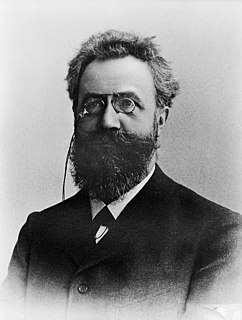A Quote by John Tyler
Nature governs man by no principle more fixed than that which leads him to pursue his interest.
Related Quotes
If [God] has made it a law in the nature of man to pursue his own happiness, He has left him free in the choice of place as well as mode, and we may safely call on the whole body of English jurists to produce the map on which nature has traced for each individual the geographical line which she forbids him to cross in pursuit of happiness.
Man is not by any means of fixed and enduring form (this, in spite of suspicions to the contrary on the part of their wise men, was the ideal of the ancients). He is nothing else than the narrow and perilous bridge between nature and spirit. His innermost destiny drives him on to the spirit and to God. His innermost longing draws him back to nature, the mother. Between the two forces his life hangs tremulous and irresolute.
Modern man lives isolated in his artificial environment, not because the artificial is evil as such, but because of his lack of comprehension of the forces which make it work- of the principles which relate his gadgets to the forces of nature, to the universal order. It is not central heating which makes his existence 'unnatural,' but his refusal to take an interest in the principles behind it. By being entirely dependent on science, yet closing his mind to it, he leads the life of an urban barbarian.
If idioms are more to be born than to be selected, then the things of life and human nature that a man has grown up with--(not that one man's experience is better than another's, but that it is 'his.')--may give him something better in his substance and manner than an over-long period of superimposed idiomatic education which quite likely doesn't fit his constitution. My father used to say, 'If a poet knows more about a horse than he does about heaven, he might better stick to the horse, and some day the horse may carry him into heaven'
Human life has not a surer friend, nor oftentimes a greater enemy, than hope. It is the miserable man's god, which in the hardest gripe of calamity never fails to yield to him beams of comfort. It is the presumptuous man's devil, which leads him a while in a smooth way, and then suddenly breaks his neck.
Upon this law, depend the natural rights of mankind, the supreme being gave existence to man, together with the means of preserving and beatifying that existence. He endowed him with rational faculties, by the help of which, to discern and pursue such things, as were consistent with his duty and interest, and invested him with an inviolable right to personal liberty, and personal safety.
For truly in nature there are many operations that are far more than mechanical. Nature is not simply an organic body like a clock, which has no vital principle of motion in it; but it is a living body which has life and perception, which are much more exalted than a mere mechanism or a mechanical motion.
That Americans are entitled to freedom is incontestable on every rational principle. All men have one common original: they participate in one common nature, and consequently have one common right. No reason can be assigned why one man should exercise any power or preeminence over his fellow-creatures more than another; unless they have voluntarily vested him with it.
How shall we define occultism? The word is derived from the Latin occultus, hidden; so that it is the study of the hidden laws of nature. Since all the great laws of nature are in fact working in the invisible world far more than in the visible, occultism involves the acceptance of a much wider view of nature than that which is ordinarily taken. The occultist, then, is a man who studies all the laws of nature that he can reach or of which he can hear, and as a result of his study he identifies himself with these laws and devotes his life to the service of evolution.
What is natural in me, is natural in many other men, I infer, and so I am not afraid to write that I never had loved Steerforth better than when the ties that bound me to him were broken. In the keen distress of the discovery of his unworthiness, I thought more of all that was brilliant in him, I softened more towards all that was good in him, I did more justice to the qualities that might have made him a man of a noble nature and a great name, than ever I had done in the height of my devotion to him.






























